May 03, 2016
Dear waste pickers and allies,
We are happy to share with you the 15th issue of “Struggles and Victories: Waste Pickers on the Frontline”. In this issue, we have news from more than 10 countries around the world!
Table of Contents
Asia
- Revised Solid Waste Management Rules Mandate Inclusion of Waste pickers in India!
- COP21: Paris – Through the Eyes of Mansoor, Our Friendly Neighbourhood Scrap Entrepreneur
Latin America
- Porto Alegre, Brazil, is the first state capital to ban incineration
- Waste reuse and recycling remains a pending challenge for the progressive model in Uruguay
- Recycling in the Dominican Republic: Inclusion of waste pickers in waste management systems
- Gender and Waste Recycling: A Toolkit for Teachers, Researchers and Practitioners
- A victory for the organized waste pickers of Ecuador
- Gender and waste project – capacity building for better communication
- Ekatina, indigenous waste pickers in Amazonas
- Scenes from the fight for inclusion in Buenos Aires, through the eyes of women waste pickers
Africa
Europe
North America
- PIMPEX and Sure We Can: visibility for NYC canners
- I Belong Here: a Vancouver binner shares his struggle
Global
- March 1st, no borders for those who fight!
- Celebrate waste pickers with this video. Waste Pickers day 2016
- Waste pickers at Cop21: Creating solutions for climate change
 Asia
Asia
Revised Solid Waste Management Rules Mandate Inclusion of Waste pickers in India! (India) by Kabir Arora (04/23/2016)
The recently released Solid Waste Management Rules in India, 2016 are a matter of celebration. They acknowledge the contribution of waste pickers. Prescriptions are made for the inclusion of waste pickers and informal waste workers (identified as informal waste collectors) in waste management services. The rules propose the issuing of occupational identity cards to waste pickers and informal waste collectors and their integration in door to collection systems as the responsibility and duty of local authorities. The rules also require the establishment of material recovery facilities, which enable waste pickers and waste collectors to separate recyclables from waste, and that incentives be provided to increase recycling initiatives that support the informal recycling sector. Local bodies have been asked to do capacity building of waste pickers and waste collectors through training. The department in charge of local bodies of all state governments has been asked to constitute state level advisory committees, which will have representatives of waste pickers and informal waste recyclers. There are few flaws in the given document and those need to be rectified while making policies and plans for solid waste management at the state and city levels as mandated by the rules. Read the complete article.
COP21: Paris – Through the Eyes of Mansoor, Our Friendly Neighbourhood Scrap Entrepreneur (India) by Meghana Joshi (12/21/2015)
Mansoor, who heads one of the dry waste collection centres of Hasiru Dala, in Bangalore, India, recently attended the UNFCCC climate change talks in Paris. Waste pickers from across the globe were invited and encouraged to exchange information, views and perceptions of how waste is being dealt with in their countries and methods by which this could improve. The annual Conference of Parties (COP) is an annual conference held to discuss and review the aims and objectives concluded upon at the Rio Earth Summit in 1992. The Earth Summit chalked out a framework which through scientific evidence has proven to be detrimental to the environment, by causing irreversible damages to the climate, Earth and ecology. So how does a waste picker help in mitigate climate change? Reduction of any waste has to happen in the first place, if it can’t be avoided, next the consumer should make an effort to reuse. Read the complete article.
 Latin America
Latin America
Porto Alegre, Brazil, is the first state capital to ban incineration (Brazil) by Câmara de Porto Alegre (03/10/2016)
The Porto Alegre municipal government approved on March 9th a legislation that prohibits incineration in the city, with the exception of items that have been discarded as waste. The legislation is backed by research conducted by Jorge Villalobos, a university professor, that confirms the health risks associated with incineration. He researched the high rates of lymphoma cases near incinerators. Researchers say that the ban on incineration is long overdue as developed countries banned the technology long ago. The representatives that approved the ban cited the examples of the European Union banning incineration there. Since 1980, Germany has considered incineration to be a symbol of environmental contamination due to its quantities of dioxins, which are released in the poor urban outskirts of cities. A ban similar to this one was approved in the city of Maringá, Brazil. Access the complete article (in Portuguese).
Waste reuse and recycling remains a pending challenge for the progressive model in Uruguay (Uruguay) by Centro Uruguay Independiente (03/14/2016)
One year after the third consecutive Frente Amplio’s national government, we still cannot envisage from the leading authority on environmental issues, the National Directorate for the Environment (Dinama), the definition of a national policy on waste, which the country is in great need of. It is required a national waste policy incorporating all waste materials, regardless of types and origin, which ties up all the “loose ends”, takes over a fading packaging/container law and surpasses the limited scope of various ministerial decrees (on agrochemical containers and other issues). From different levels (political, social, environmental and trade union) have arrived proposals and claims for a space to collectively build this policy. Why has this not been brought together? They carry on ignoring and looking down on the ones who can contribute much to this topic. They need to take into account, as a fundamental point to consider, the ones who have long experience in sorting. Who benefits from this ineffective stagnancy which has been running on the progressive model for already 11 years? The ones working with waste are the only victims in this situation, and the ones who will be affected as the time goes by. There is not even a design for a national strategy to solve the problems waste materials present through a supportive and inclusive serious social policy. Access the original article in Spanish.
Recycling in the Dominican Republic: Inclusion of waste pickers in waste management systems (Dominican Republic) by Felipe Rosario (03/01/2016)
In the Dominican Republic, we are approximately between 5.500 and 6000 working with recycling waste materials in landfill sites, transfer stations and in the streets. Even though we contribute to the recycling economy and to a more sustainable waste management, we have lived for decades in a situation of total anonymity and marginalization. We have been victims of poverty, marginalization and social exclusion in a society which has no sustainable waste management culture. For a number of years, we have been organizing and fighting for our formal inclusion in the new waste management systems. In order to achieve this, we have received support from allies at a local and international level. Our working conditions have not improved, especially with hard conditions on landfill sites, from which we have been kicked out in the most abusive ways. The new Solid Waste Management Draft Law of the Dominican Republic opens up an opportunity, because it is the first time we have been recognized as agents in waste management and recycling in particular. For our trade, this is a time to celebrate. Even so, we view with concern the future situation of thousands of colleagues who will be thrown out with the closure of land filled sites and the banning on access to waste disposal sites. Access the original article in Spanish.
Gender and Waste Recycling: A Toolkit for Teachers, Researchers and Practitioners (Brazil) by Sonia Dias, Ana Carolina Ogando (04/18/2016)
As part of the Waste and Gender Project, this toolkit was developed for a broad audience interested in understanding the connections between gender inequalities in the waste sector. There are three books, available in English, Spanish, and Portuguese, along with pullout exercises from workshops conducted with women waste pickers on gender and waste. While academic studies increasingly focus on waste picking and solid waste management, including the threats and risks faced by informal recyclers, there is still a gap when it comes to understanding the gender dynamics and sexual division of labour involved in waste picking activities. The Gender and Waste Project, undertaken in 2012-2015, sought to fill this gap by working closely with women waste pickers in Minas Gerais, Brazil, in a horizontal and participatory process. The aim of the exploratory research-action project was to understand women’s concerns regarding gender inequality in their workplaces, homes, and within the national movement of waste pickers. Preceded by a popular toolkit, which seeks to engage waste workers by introducing key gender inequality issues, this Toolkit includes identification of conceptual issues related to gender and waste, a framework for groups interested in holding workshops, and additional resources.
A victory for the organized waste pickers of Ecuador (Ecuador) by RENAREC (03/22/2016)
“Compañero is one who stands with you!” This is how Laura Guanoluisa, the leader RENAREC (Ecuadorian National Waste Pickers Network), began her address. The important event was attended by many waste pickers who filled the hall. The agreement was signed by the Ministry of Economic and Social Inclusion, the Ministry of the Environment, the Popular and Solidarity-based Economy Institute and RENAREC. In her powerful discourse, Laura highlighted four fundamental points which will follow the signing of the agreement. The first point is related to social security access for all of Ecuador’s waste pickers, as there are more than 20.000 families who work in that profession in the country. The second is to achieve recognition as providers of a recycling service by means of a salary, given the benefits and savings they bring to municipalities, industry, society and to the environment. The third demand is that the recycling industry buy recyclables directly from waste pickers at fair prices. The fourth demand is that RENAREC, with MAE’s help, will support citizens’ initiatives in order to strengthen waste pickers. Read original post (in Spanish).
Gender and waste project – capacity building for better communication (Brazil) by Sonia Maria Dias
In May 2015, a workshop on communication and leadership skills with women waste pickers took place as part of the Gender & Waste Project in a partnership of WIEGO/MNCR with the International Coaching Federation (ICF). The ICF carried out a voluntary three-hour workshop with 70 women waste picker leaders from the state of Minas Gerais who belong to the Cataunidos, Redesol and Catavale networks. The overall objective of the workshop was to discuss women’s leadership roles in their cooperatives and encourage women to pinpoint their own leadership abilities and weaknesses, in order to think of more effective ways to manage their cooperatives. The women who participated felt the workshop was particularly useful because it used practical examples of the very challenges they face on a daily basis. After the workshop, 10 women leaders were chosen to have follow-up individual coaching sessions to target their individual needs and interests. The video with Ivaneide Souza, Redesol’s leader, highlights how the workshop was beneficial and innovative. This article is part of the series “Scenes from the Heart of Recycling”.
Ekatina, indigenous waste pickers in Amazonas (Brazil) by Ricardo Abussafy de Souza
São Gabriel da Cachoeira is a city located in the northern part of the Brazilian state of Amazonas. Situated on the borders of Venezuela and Colombia, it is on the margins of urban development policies involving state and federal planning. On the edge of São Gabriel da Cachoeira and next to the city dump, we can find the Ekatina Association for Recyclable Materials – part of the indigenous community of Boa Esperança. However, there is a stark contrast between this group and the Amazon itself, which is not only admired for its diverse fauna and flora, but for being at the center of many discussions, disputes and problems. After working in the fields, the indigenous waste pickers hear the garbage truck arriving and run to pick aluminum cans out of the trash. Sifting through food scraps from the city’s residences and military facilities, among mosquitoes and dogs, the Baré and Toucan Indians dig deep in the trash before the municipality burns whatever has not been picked up. The waste pickers walk 500 meters to get to their homes after collecting the cans – the only material with sales value. In order to sell the materials, waste pickers must take their collected recyclables by boat to the capital, a journey that can take up to five days. They leave the landfill but the landfill does not leave the community. The smoke from the garbage that the municipality burns sometimes invades the daily lives of the members of the community. Nausea and headaches are common among the families there. Read the complete article.
Scenes from the fight for inclusion in Buenos Aires, through the eyes of women waste pickers (Argentina) by Sonia Maria Dias (10/19/2015)
In March of 2015, Sonia Dias, waste specialist with WIEGO, documented the struggles and conquests of women waste pickers in Buenos Aires, Argentina. In the videos below, Tania Alfonso, Paola Caviedes and Jacqueline Flores discuss their victories, dreams and the important role of women waste pickers. This is part of the series Scenes from the Heart of Recycling.
 Africa
Africa
An influx of waste-to-energy projects in South Africa (South Africa) by Musa Chamane, GroundWork campaigner (03/15/2016)
Due to various challenges experienced by the government regarding waste, incinerators have been pitched as a solution, when in fact they are a false solution. Waste companies, including cement companies, have consistently knocked on government doors for approval of incinerators to deal with waste but under the disguise of waste-to-energy, pyrolysis, gasification projects, and a myriad of other euphemisms. Incinerators are camouflaged as waste-to-energy projects in response to Eskom experiencing challenges in coping with its ability to meet the power demand. There are number of waste incinerators that are being proposed in different areas in South Africa. These incinerators are proposed by private developers. The community will not benefit since they would just provide high tech jobs. Waste incineration is a false solution because it muscles waste pickers out of the economy. Recyclables are burnt to keep the high temperatures in incinerators. In most cases, municipalities sign binding agreements with municipalities to supply waste to the incinerator. If the municipality fails to provide waste as per agreement, the municipality will need to compensate the private company. Read the complete article.
 Europe
Europe
Will Waste Pickers in Turkey Join the Unemployed Army? (Turkey) by Serter Oran
During the European Union Integration Process and Integrated Environmental Approximation Strategy, Turkey began to synchronize its national law. In regards to waste management, municipalities are in charge of establishing and managing recycling facilities or assisting private companies to establish them. The law emphasizes waste collection performed by licensed firms. It is clear that informal waste pickers have been excluded from the Environmental Law. Yet they are key actors in the recycling chain — in Turkey, working 15 hours per day and collecting an average of 200-250 kg of waste daily. However, their income is nominal. They do not have access to social protection or good working conditions. It is a survival strategy for those with few other options. Waste management in Turkey needs critical development which supports the inclusion of waste pickers. Currently, the firms don’t have enough vehicles and employees for effective collection, whereas waste pickers don’t have fixed schedules and can work at any time of the day. Furthermore, the firms lack the knowledge waste pickers have; they don’t know the streets as well as the waste pickers do. If firms take the initiative in waste management, very few waste pickers will be employed. Read the complete article. Check out the video “Waste Pickers in Turkey: An Overview“, from the globalrec.org series “Scenes from the Heart of Recycling“.
 North America
North America
PIMPEX and Sure We Can: visibility for NYC canners (United States of America) by Pimpex (04/11/2016)
The canners of NYC are autonomous workers who earn a living by collecting cans and bottles to be recycled. Through their selective collection activity they greatly contribute to recycling in the city. ‘Canning’ is also crucial for their livelihoods. However, they are not officially recognized as workers, which puts them in a vulnerable and marginalized situation. Sure we can is the only non-for-profit redemption center in NYC. It provides a safe space for canners to redeem cans and bottles for 5cents each. SWC is collaborating with Pimp My Carroça to promote this Pimpex NY edition. Pimp my carroça is a social, cultural and environmental project to promote visibility, respect and security for waste pickers/canners/recyclers. It started in Brazil where artist Thiago Mundano promoted a collective action to reform and paint the waste pickers’ carts and provide equipment to the workers. PIMPEX is a micro version of this project that can be adapted and situated in different contexts. We want to bring this action to support canners in New York City! Visit the campaign page to find out about the canners, the artists, and the mission!
I Belong Here: a Vancouver binner shares his struggle (Canada) by Binners Project (02/16/2016)
Meet Michael Leland, a local binner (aka “waste picker”) in the downtown eastside of Vancouver. He shares his past, how he became a binner, and the challenges he must face on a daily basis. Eventually we discover his involvement in the Binners’ Project, a group of waste-pickers dedicated to improving their economic opportunities, and reducing the stigma they face as informal recyclables collectors. Watch the video on Vimeo.
Global
March 1st, no borders for those who fight! (-) by FACyR, ARB, RENARC, UCRUS, Sure We Can, Amelior (03/01/2016)
Today, March 1, we commemorate International Waste Pickers’ Day in remembrance of our compañeros who were brutally assassinated in the Universidad Libre de Barranquilla (Colombia) in 1992. That terrible day, waste pickers were tricked by personnel from the Universidad Libre de Barranquilla, who invited them to enter into the premises of the university under the pretense of providing them with recyclable materials. Once inside they were beaten and shot to death so that their bodies could be used for research and organ trafficking. The tragedy was denounced by a survivor, who during the attack pretended to be dead and later escaped. According to the ILO, there are more than 20 million people engaged in recycling in the world. In each country our sector has unique story. We are on the lookout for legislative changes that are taking place in several parts of the world attempting to leave the management of recycling in the hands of private companies, excluding waste pickers and their organizations. This is the case in Turkey where the Environmental Law whereby the purchase of materials from waste pickers is not legal was approved. This affects 500,000 people that make a living by picking waste. Let’s commemorate this day by raising the flags of the cartoneros in favor of the recognition of our profession and work conditions, just as any other worker (minimum wage, social rights, social and health protection, and recognition of our organizations as legitimate). ¡Si tocan a uno nos tocan a todos! Colombia, USA, France, Ecuador, Uruguay, Argentina.
Celebrate waste pickers with this video. Waste Pickers day 2016 (-) by GlobalRec
This 7-minute animated film shows how cities on different continents have taken diverse approaches to integrating waste pickers in municipal waste management systems and how waste pickers, residents and city budgets have all benefited. Millions of people worldwide make a living by collecting, sorting and selling what others have thrown away. These informal waste pickers do a great service for their cities but are often overlooked, maltreated and even criminalized. Waste picking provides crucial earnings for families. It also makes cities more beautiful and more healthful. Recycling leads to lower greenhouse gas emissions and preserves resources. Due to the waste pickers’ efforts, many cities in developing countries have higher recycling rates than western, industrialized cities (UN Habitat 2010: 207). Plus, integrating waste pickers can save municipalities money: even when waste pickers are paid fairly for their labour, the transport and landfill costs decrease as waste pickers perform recycling services at lower rates than those charged by big profit-oriented companies. Many cities have realized the benefits of integrating waste pickers into their municipal waste management programmes. Often, it is waste pickers who lead this change by first organizing, then advocating for recognition of their important role. More information and documents at the WIEGO website. ¡Celebrate waste pickers’ day sharing this video!
Waste pickers at Cop21: Creating solutions for climate change (France) by pablo
At the last COP21 in Paris, a panel organized by Zero Waste Europe GAIA and Zero Waste France, brought together waste picker leaders from four continents: America, Asia, Africa and Europe. The goal was to share the experiences of waste pickers from all over the world, to show that waste reduction, reduce, recycling and prevention are answers to climate change: Waste pickers: Paving solutions path to climate change. Waste picker leaders from Brazil, Colombia, India, South Africa and France (KKPKP, SWaCH, Safai Sena, GAIA, CHINTAN, SAWPA, ARB, Amelior and MNCR) formed a great panel in a packed room, that engaged with the speakers in a long debate session. The videos of the panel are available on YouTube.
Tweet


 Asia
Asia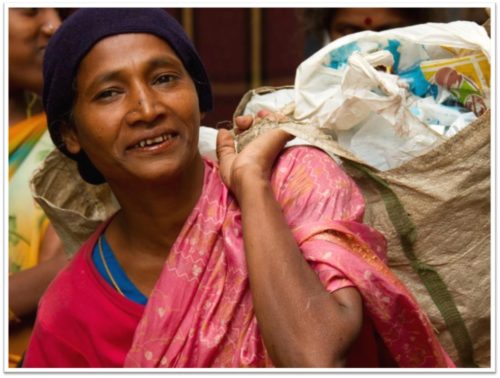
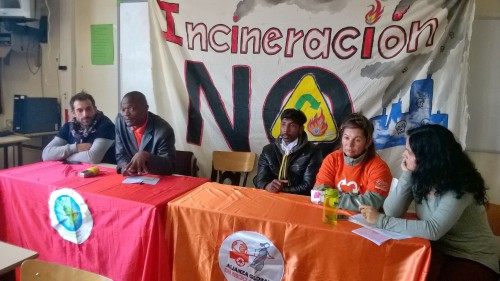
 Latin America
Latin America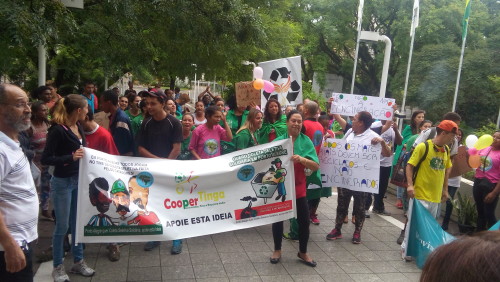

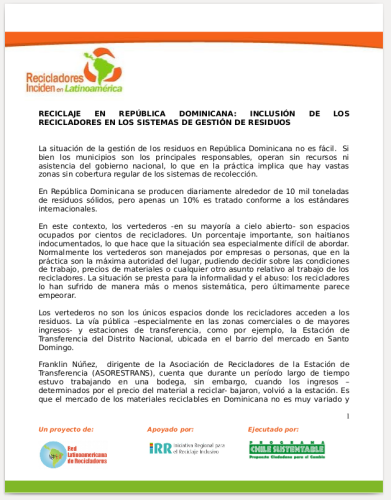
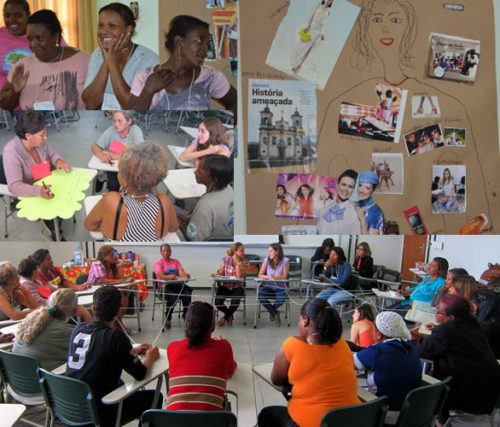
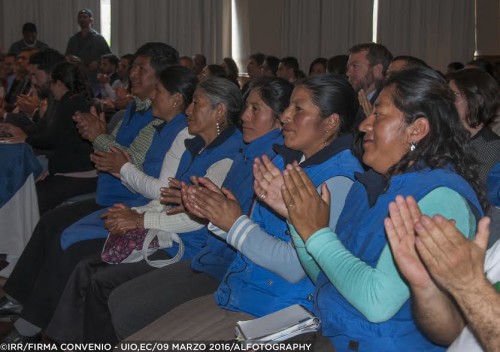
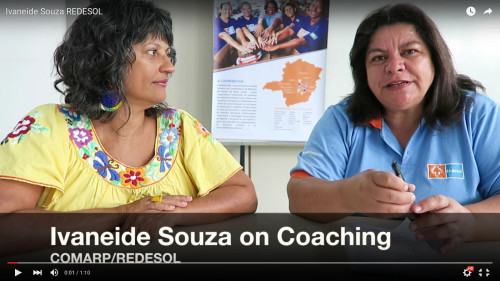

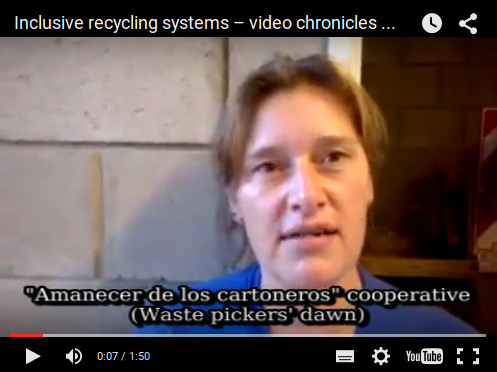
 Africa
Africa
 Europe
Europe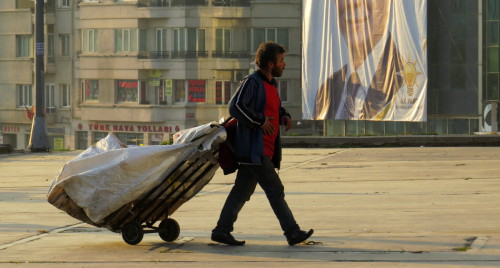
 North America
North America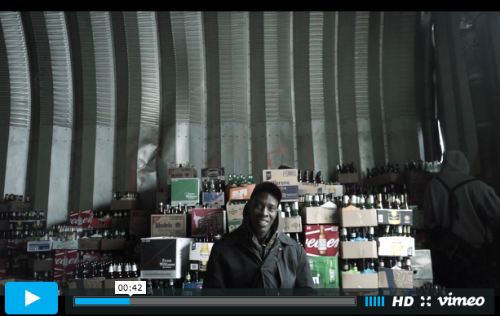
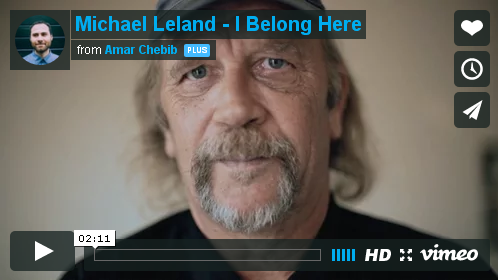
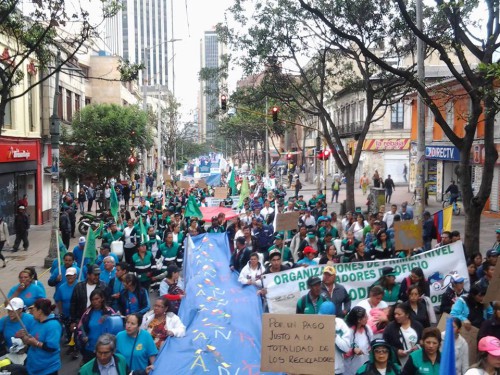
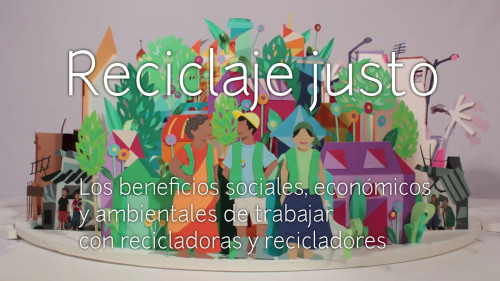
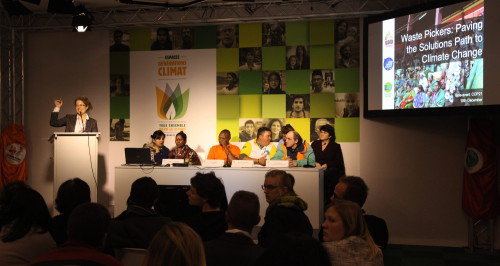
Leave a comment